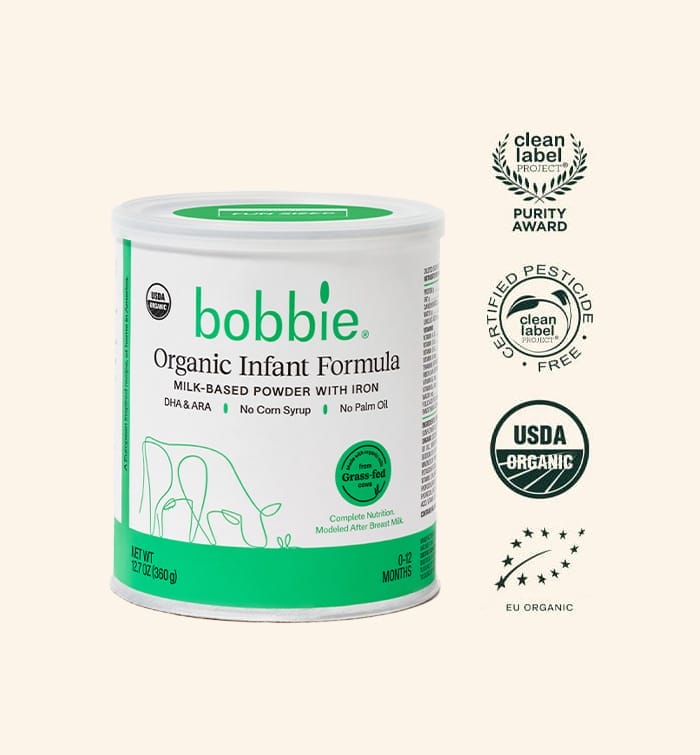We are proud to say that these posts are not sponsored. Our editorial team of Bobbie moms and writers personally select each featured product. If you buy something through our links, we may earn an affiliate commission, at no cost to you.
Congratulations! You’re a new dad! During this chaotic, amazing, and overwhelming period, you might be up late at night searching for “new dad tips” or “how to support my partner“, especially when it comes to feeding your baby. Look no further, dads! We’ve got you covered. We talked to John and Paul, co-founders at Fathercraft to get their take on new fatherhood, and exactly how they tackled feeding their babies and beyond. These dads know that feeding can be anything but straightforward. They each have some amazing insights on feeding your newborn, whether your choice is to breastfeed or formula feed or use a mix of the two. Here are the top tips for dad feeding baby.
Advice for Dad Feeding Baby: 7 Bottle Feeding Tips for Dad
Feeding your newborn breast milk or baby formula
Whether you breastfeed or formula feed, you will probably use baby bottles at some point. Good bottles and a bottle warmer will save you a ton of time.
When you make a bottle for your baby, with infant formula or breastmilk, it has to be at the Goldilocks temperature–juuuuuust right. A good bottle warmer will square that away with a click of a button.
Choosing the best infant formula
This is a topic that a lot of parents struggle with, the dads at Fathercraft included. They shared their thoughts on choosing a formula: “The ingredient lists can be so insane, and you have to wonder if the random name-brand products are okay for your child. Well, we’re here to say that we’ve tried name-brand formula, organic baby formula and European style formula, and we’ve found success with each one”. There isn’t a wrong choice among them (as long as they are FDA regulated).
It is worth testing a few formulas out to see what works for your baby, and what you feel best about. Read the formula labels and make sure you see what you want to see. There are some ingredients to make sure are included (DHA, lactose) and some that you might not want included (palm oil, corn syrup, soy allergens).
7 Bottle tips for dads feeding baby
After talking to Bobbie parents and the dads at Fathercraft, we’ve come up with the top 7 bottle tips for new dads feeding baby.

Shop Bobbie Organic Infant Formula
Bobbie Organic Infant Formula is a USDA Organic, EU-style infant formula that meets all FDA requirements. It is a complete nutrition milk-based powder modeled after breast milk and is easy on tummies. It is non-GMO and doesn't have corn syrup, palm oil, or maltodextrin. Learn more about Bobbie.
1. Safely prepare bottles
The number one rule for preparing bottles: wash your hands! You also want to make sure that you’re following proper storage rules for both baby formula and expressed breast milk.
2. Mix well
If you’re mixing baby formula, you’ll want to be mindful of how you’re mixing. Make sure it is completely combined, and that there are no clumps of formula in the bottle. Pro-tip: if you have a gassy baby, try swirling or stirring with a clean fork to combine. Less bubbles in the bottle!
3. Use responsive feeding techniques/paced feeding techniques while feeding your baby
If you both bottle feed and breastfeed your baby, responsive/paced feeding techniques mimic the feeding experience at the breast. It can also be helpful for exclusively bottle fed babies, especially if they struggle with reflux! Paced bottle feeding looks like:
- Feeding in an upright position (rather than cradled in the crook of your arm)
- Keeping the bottle in a horizontal position, without the milk or formula filling the whole nipple (just enough to cover the hole of the nipple)
- Use a slow-flow nipple
- Burping every ounce or two
- Watching for fullness cues (open hands, turning away from the bottle, etc.) and not forcing your baby to finish the bottle
4. Sterilize bottles
If your baby is still a newborn or is immunocompromised, you want to be sure that you properly sterilize your baby bottles, nipples, and all additional bottle parts. You can do this using boiling water or a bottle sterilizer.
5. Wash bottles
This is a great way for dad to step in and help! If you don’t have a dishwasher, collect your dirty bottles in a basin and then wash them with warm, soapy water. If you have a dishwasher, make sure to take apart the bottle (remove the nipple from the collar and all other parts) and you can load them on the top rack of your dishwasher. Make sure to unload them once they’re done, too!
6. Learn your baby’s schedule
Don’t rely on your partner to tell you when to feed your baby. Learn your baby’s schedule so that you know when to step in to help not only feed your baby, but when to put them to sleep, wake them up, etc. Also, pay attention to your baby’s hunger cues. Hunger cues look like: rooting for the bottle or the breast, closed fists, and sucking on their hands/smacking their lips. Pro-tip: this will also make it easier for everyone when your partner is out of the house!
7. Take a nighttime feed
Splitting nighttime feeds can be helpful if you’re exclusively bottle feeding, but it can also give your partner some much-needed rest if your baby is breastfeeding, too. Discuss with your partner how to divvy up feedings after bedtime in a way that works for you both.
Supporting your partner during the newborn months
For John from Fathercraft, formula was used from the beginning and feeding was an equal responsibility between him and his partner. It was about mutually supporting each other and working through issues like allergies together.
Paul from Fathercraft, on the other hand, admits breastfeeding was a time where he felt helpless at first. He would support his partner by doing other things around the house. Although, nothing will beat the first time he fed his baby: what he refers to as a “surreal experience.”
Tips for dads with newborns
While John and Paul want to make it clear that they don’t want to tell you what to do and what not to do, they want to share their experiences and offer to learn from them. Here are their top tips:

1. Don’t close yourself off emotionally
Being affectionate and showing emotion around your children will help build their emotional intelligence. You are your baby’s everything, so showing them that men have emotions can be very powerful.
2. Don’t be absent
Dads are no longer going to sit on the sidelines of parenting. Even if there are things that you can’t do, like give birth or breastfeed, you can still do so much to support your partner and child. Changing diapers, feeding bottles, reading bedtime stories, holding, kissing and playing with your baby are all great ways to be present.
3. Don’t skimp on sleep
Sleep comes easier for some than others, but everybody needs it. We continually stress how important a good sleep schedule is for your baby because the more the baby gets, the more you get. Also, as tempting as having a couple beers after the baby falls asleep is, don’t fall into that habit too hard! You don’t have to give up late night ice cream and Netflix forever, but while you have a newborn, it is worth putting that aside.

Shop Bobbie Organic Infant Formula
Bobbie Organic Infant Formula is a USDA Organic, EU-style infant formula that meets all FDA requirements. It is a complete nutrition milk-based powder modeled after breast milk and is easy on tummies. It is non-GMO and doesn't have corn syrup, palm oil, or maltodextrin. Learn more about Bobbie.
The main takeaway for all new dads
John and Paul note that there will be plenty of tears (and that’s okay!). Tears from stress, anxiety, and uncertainty. But also tears from joy, fulfillment, and the most pure love you’ll ever experience.
Take in a lot of information, choose what works best for you, and just keep going. It’ll be a really, really awesome ride. Good luck, Dad.

